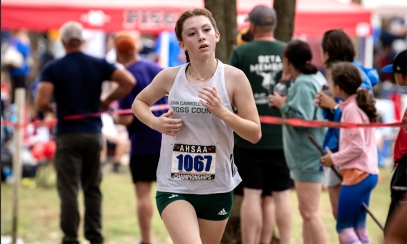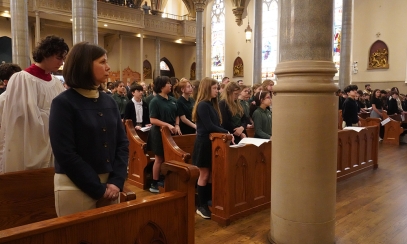
Bishop designates Jubilee 2025 pilgrimage sites
As the Universal Church marks Jubilee 2025, it is a time of spiritual reconciliation and renewal for the faithful, striving to be “Pilgrims of Hope.” While the origin of a jubilee can be found in the Jewish faith, the first Christian Jubilee, which was instituted by Pope Boniface VIII, was celebrated in the year 1300. The number of years between Jubilees varied following the first, but since the late 1400s, the Church has marked a Jubilee Year every 25 years. With the last ordinary Jubilee being that of Pope St. John Paul II’s Great Jubilee 2000, Pope Francis on Ascension Thursday, May 13, 2024, announced Jubilee 2025 in the Papal Bull of Indiction Spes non Confundit (Hope Does Not Disappoint).
One aspect of the Holy Year is pilgrimage, which by its very nature is an "experience of conversion." Spiritually, pilgrimage represents the Christian life as a journey towards a deeper relationship with Christ, with the destination being Heaven. To help the faithful of the diocese experience this conversion, Bishop Raica has designated 11 pilgrimage sites within the Diocese of Birmingham.
The sites are:
Cathedral of St. Paul in Birmingham
Chapel of Holy Wisdom at St. Francis of Assisi University Parish in Tuscaloosa (bell tower adjacent to Saban Catholic Student Center)
St. Leo the Great Catholic Church in Demopolis
St. Joseph’s Chapel at Annunciation of the Lord Catholic Church in Decatur
Good Shepherd Catholic Church in Russellville
Holy Spirit Adoration Chapel at Holy Spirit Catholic Church in Huntsville
St. Mary of the Visitation Catholic Church in Huntsville
Our Lady of the Valley Catholic Church in Fort Payne
St. John the Apostle Catholic Church in Alexander City
Chapel of Our Savior at Our Lady of Sorrows Catholic Church in Homewood
The Shrine of the Most Blessed Sacrament in Hanceville.
Another aspect of the Holy Year is an indulgence. Indulgences are offered by the Church for the one seeking the indulgence or for the souls in Purgatory, and they forgive the temporal punishment due to sin that remains after the eternal punishment of our sins has been forgiven. “To put it another way,” explains Father Bryan Jerabek, judicial vicar for the diocese, “effects of our sins remain even after they have been pardoned by God. These effects take multiple forms: a debt of justice, harm caused to others, wounds in our own souls, strained relationships, difficult memories, and so forth.” Father Jerabek continued: “Indulgences may be plenary (complete, full) or partial. When one successfully gains a plenary indulgence, the entirety of his temporal punishment due to sin (his spiritual debt) is remitted, thanks to the grace of God made available by the Church, using the Power of the Keys given to her by Christ Himself.”
According to Father Jerabek, in order to gain any plenary indulgence, it is necessary to fulfill certain conditions. First, one must intend to receive the indulgence (a general or virtual intention is sufficient). Second, one must be free from all attachment to or affection for sin, even venial sin. Third, the one seeking the indulgence must go to Holy Communion in the state of grace within 20 days before or after intending to receive the indulgence. Fourth, one must go to confession within 20 days before or after intending to receive the indulgence. Fifth, one must pray for the intentions of the Holy Father (typically, by praying an Our Father, a Hail Mary, and a Glory Be). Lastly, the person seeking the indulgence must do the specific works connected with gaining the particular indulgence.
For Jubilee 2025, the Apostolic Penitentiary outlined the specific works to obtain the Jubilee Indulgence: pilgrimage, pious visits to sacred places, and works of mercy and penance.
Regarding pilgrimage, the faithful can obtain the Jubilee Indulgence if they make a pilgrimage to any Jubilee site (in Rome, in the Holy Land, or in other ecclesiastical areas) for Holy Mass, Liturgy of the Hours, the Via Crucis, the Marian Rosary, the recitation of the Akathist hymn, or a penitential celebration. The sites designated by Bishop Raica fall under the Penitentiary’s “other ecclesiastical areas.”
The faithful may also obtain a Jubilee Indulgence if they visit any Jubilee Site for a “suitable period of time” and engage in “Eucharistic adoration and meditation, concluding with the Our Father, the Profession of Faith in any legitimate form, and invocations to Mary, the Mother of God.” For those unable to participate in a pilgrimage (i.e., cloister religious, the elderly, the sick, prisoners, or those who offer continual care for the sick), the Jubilee Indulgence can be obtained if they are “united in spirit with the faithful taking part in person” and if “they recite the Our Father, the Profession of Faith in any approved form, and other prayers in conformity with the objectives of the Holy Year, in their homes or wherever they are confined … offering up their sufferings or the hardships of their lives.”
The third specific work given by the Penitentiary offers a wider range of opportunity. It involves works of mercy and penance. One option is for the faithful to participate in missions, spiritual exercises, or formation activities centered on the Second Vatican Council or the Catechism of the Catholic Church. Such activities are to be held in a church or “other suitable place.” Another option is for the faithful to practice the corporal and spiritual works of mercy. Doing so can include visiting those in need or in difficulty (i.e., the sick, prisoners, lonely elderly people, or disabled people). Yet another option is for the faithful to “put into practice the spirit of penance” by abstaining “at least one day a week from futile distractions (real but also virtual distractions, for example, the use of the media and/or social networks) [and] from superfluous consumption.” One can also donate money to the poor, support works of a religious nature (i.e., protection of life, support of children in need, support of the elderly, support of migrants), or volunteer in service to one’s community.
As the faithful continue to journey to a deeper relationship with Christ during Jubilee 2025, Bishop Raica reminds his flock, “As parishioners throughout the Diocese of Birmingham, we are encouraged to embrace this opportunity to become agents and voices of hope in our communities, reflecting the love and mercy of Christ in our daily lives. Every small step can result in positive steps forward.”
For more information about Jubilee 2025, please visit the diocesan website, www.bhmdiocese.org/jubilee-2025. The site provides parish staff and the faithful with access to various Vatican documents and general Jubilee 2025 information, including calendars, FAQs, indulgence FAQs, and resources. For more information on the diocesan pilgrimage sites, please visit www.bhmdiocese.org/diocesan-sites.



